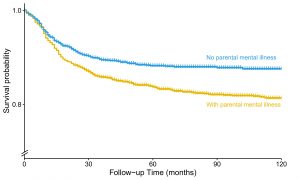An international research team led by Ji Jianguang, professor in the Faculty of Health Sciences (FHS) at the University of Macau (UM), along with Jan Sundquist and Kristina Sundquist, professors at Lund University in Sweden, has discovered a significant association between parental mental illness and higher mortality in children diagnosed with cancer. Using extensive data from nationwide registers in Sweden, the study shows that children whose parents suffer from mental illnesses, particularly those who develop mental health disorders after the child’s cancer diagnosis, face a higher risk of dying from cancer compared to children whose parents do not have these conditions. These findings underscore the need to address parental mental health and the clinical importance of supporting family mental health as an integral part of pediatric cancer care. The study has been published in Journal of the National Comprehensive Cancer Network, a leading journal in the field of oncology.
Despite significant progress in medical treatment over the past few decades, cancer remains the leading cause of disease-related death among children worldwide. A cancer diagnosis in a child not only impacts the child, but also profoundly affects the entire family system. Previous studies have shown that a childhood cancer diagnosis may worsen parental mental health, which may then affect the quality of care provided to the child. However, the relationship between parental mental health and a child’s cancer prognosis has not been systematically examined. By leveraging data from several Swedish population-based registers, including records from primary care clinics and specialist hospitals, the research reveals for the first time how parental mental health conditions influence a child’s prognosis.
In this nationwide cohort study, the research team conducted a longitudinal analysis of all children diagnosed with cancer between 2005 and 2016, and their parents. The team discovered, for the first time, that children with cancer had a 47% higher mortality risk if one of their parents had mental illness following the child’s diagnosis. The risk was even higher—more than doubling—if both parents were affected. These findings underscore the importance of family mental health, particularly parental mental health, in pediatric cancer care. The study also emphasises the need for a more holistic approach in standard pediatric cancer care in order to address the psychological needs of families. It stresses that incorporating parental mental health screenings into the standard treatment process, along with timely interventions, such as psychological counselling and medication management, could improve the survival rates of children with cancer. Furthermore, the study provides the strongest population-level evidence to support the development of comprehensive family intervention guidelines for childhood cancer care.
The corresponding author of the study is Prof Ji, with Liu Yishan, a doctoral student at Lund University, as the first author. The research project was supported by Swedish Research Council (Vetenskapsrådet) (File No.: 2021-01187 and 2024-02734). The full version of the research article is available at: https://jnccn.org/view/journals/jnccn/aop/article-10.6004-jnccn.2025.7009/article-10.6004-jnccn.2025.7009.xml.
| Source: Faculty of Health Sciences | |
| Media Contact Information: | |
| Communications Office, University of Macau | |
| Albee Lei | Tel: (853) 8822 8004 |
| Bell Leong | Tel: (853) 8822 8009 |
| Email: | prs.media@um.edu.mo |

